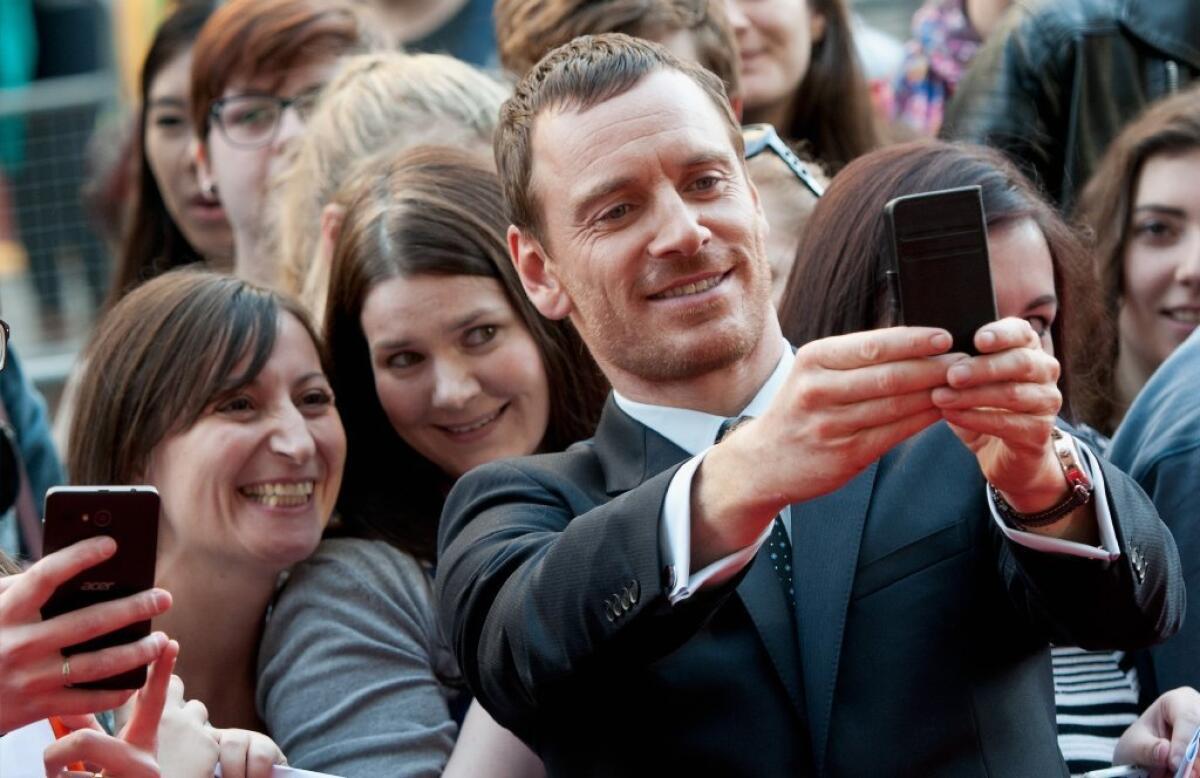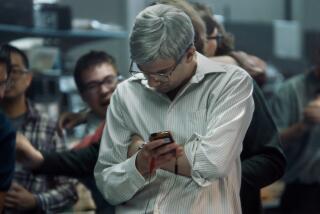Michael Fassbender talks ‘Steve Jobs,’ iPhones and working naked

Given what Michael Fassbender has told us about his “allergic reaction” to technology, we’re guessing there’s only a 50/50 chance this photo turned out.
- Share via
Reporting from NEW YORK — Every time Michael Fassbender talks about his iPhone -- and, since he’s playing Apple co-founder Steve Jobs in the audacious biopic “Steve Jobs,” the subject comes up now and then -- Fassbender reflexively pats the front pocket of his dark blue jeans just to make sure the device is still there.
“I’ve lost so many of them,” he says, laughing and, with a wave of his hand, adding, “they come and they go.”
Given the 38-year-old actor’s “allergic” relationship with technology, it isn’t surprising to learn that Fassbender knew little about Jobs before the film’s director, Danny Boyle, sent him Aaron Sorkin’s screenplay. An obsessive researcher, Fassbender then used his phone to do one of the two things he says it’s good for -- preparing for his role.
SIGN UP for the free Indie Focus movies newsletter >>
“It’s so great,” Fassbender says. “I can Google anything, whether it’s an accent or information, and it’s all there. I don’t have to go to the library anymore. I don’t even have to get dressed. I can be naked and working!”
We did say Fassbender has two uses for the phone. The other, revealed during a tandem interview with Boyle the day after “Jobs” had its gala screening at the New York Film Festival, comes down to another kind of convenience. The technology, he says, gives people the ability to easily, instantly communicate if they’re running late or can’t find the location for a meet-up.
“So what did we do before?” Boyle asks his friend, curious.
“I just remember hours of waiting. Or people not waiting,” Fassbender says. “Or going to the wrong place. There were so many of those occasions, don’t you think?”
“I don’t actually,” Boyle answers, a response that makes Fassbender double over with laughter. “That’s entirely possible,” the actor replies. “It might just be me.”
“Steve Jobs” plays out in three distinct acts, each taking place backstage before a splashy product launch, introducing and expanding Jobs’ relationships with family members and colleagues and technological devices and, in the process, revealing the essence of the man.
The first segment, the anxiety-ridden unveiling of the first-ever Macintosh in 1984, shows Jobs pointing to the little computer, telling colleagues that it resembles a friendly face with the disk slot being its goofy grin. It’s a classic example of Jobs’ determination to convince people to see things as he sees them (Andy Hertzfeld, a member of the original Mac design team, called it Jobs’ “reality distortion field”), even if, as Boyle notes, that disk slot bears little resemblance to a whimsical smile.
“He wanted people to see the Macintosh as a toy because, before this, computers were perfunctory and gray and scary,” Boyle says. “But if it’s a toy, then you can develop an emotional relationship with it.”
“A friend of mine put stickers on his computer that say, ‘This is a tool. It’s not a relationship,’” Fassbender says. “You could say he doesn’t buy into that vision.”
Fassbender doesn’t, either. Going out to meals, he has a rule: no phones. If somebody at the table brings one out, the actor will politely ask them to put it away. And when he’s on vacation or working, he turns his devices off. And since he’s almost always working (“Jobs” is his third movie this year; he’ll likely have at least four in 2016), people know not to expect an immediate reply.
“The levels of communication now, whether it’s texting, answering the phone, emailing, twittering ... where does one find the time?” Fassbender asks. “It’s an annoyance. Bing! Bing! Bing! We’d all be in a better place mentally, I think, if we just turned them off and looked at each other.”
Twitter: @glennwhipp
MORE:
Oscar Watch: ‘The Martian,’ ‘Steve Jobs’ and ‘Bridge of Spies’ make their cases
Hollywood Film Awards billed as the launch of awards season, but CBS won’t air it this year
Critics’ lasting impressions from TIFF ahead of fall movie releases and award season
More to Read
From the Oscars to the Emmys.
Get the Envelope newsletter for exclusive awards season coverage, behind-the-scenes stories from the Envelope podcast and columnist Glenn Whipp’s must-read analysis.
You may occasionally receive promotional content from the Los Angeles Times.








